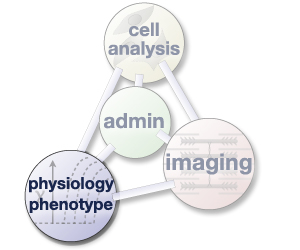
Section 'Sub' Navigation:
Center Cores & Technologies - Phenotyping & Physiology Core
|
The Phenotyping Core is designed to evaluate the functional properties of muscles, joints, and whole animals in animal models created by the various Center investigators or directly in human muscle. The Phenotyping Core will interface with the High Throughput Cell Analysis Core and the Imaging Core by helping Center investigators identify the appropriate functional evaluation of muscle, with special consideration of the specific manipulation created by the Center investigator. The quantitative functional evaluation conducted by the Phenotyping Core will often be combined with structural data obtained from the Imaging Core thereby providing possible mechanistic explanations for any functional effects that are found. Thus, the Phenotyping Core will provide accessibility to sophisticated physiological and biomechanical testing capabilities to all Center investigators. |

|
Core Director
 Samuel R. Ward, PT, PhD |
Samuel R. Ward, PT, PhD is the director of the SDMRC Phenotyping & Physiology Core. More information on the core directors and their research interests. Contact: Telephone: 858-534-4918 Fax: 858-552-4381 [email protected] |
Specific Aims of the Core
Available Technologies
Please contact Dr. Ward directly for service inquiries. |